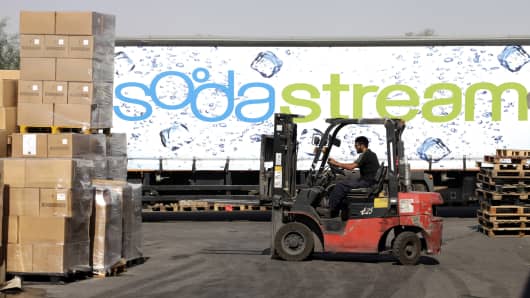For the most part, this idea makes sense. And it's the linchpin of those who believe that special investment incentives, IMF loans, and non-governmental-organization (NGO) facilitated pilot business programs are essential tools for peace.
Wouldn't it be harder to recruit the would-be terrorists and militants of the world if a good-paying job was the alternative? Wouldn't blowing up buildings be a dumb thing to do when you were the person who built or invested in that building in the first place?
Read MoreShopkeepers in Iraq ordered to put veils on mannequins
These may seem like rhetorical questions, but in the Middle East economic sanity and the power of prosperity just don't work the way they should in bringing about lasting peace.
And it has been that way for almost 100 years, especially when it comes to Arabs living alongside Jews in what is now Israel and Gaza.
But it wasn't always that way.
99.9 percent of every Jew and Arab in Israel and Gaza today is a direct descendant of someone who came to the Holy Land after 1880. That was the year that thousands of Jews fled persecution in Europe and joined the small indigenous Jewish population in what was then the Ottoman Empire-controlled Palestine. Somewhere between 100,000 and 200,000 non-Jews were already living there at the time as well.
Read MoreIsrael flight ban leaves travelers scrambling
But with the Jews coming to build up and improve the land, hundreds of thousands more Arabs poured in to get the jobs and opportunities with the Jews that they could not get elsewhere in the Arab world.
And, according to all the economic lessons we have learned about jobs and harmony, there was peace.
For more than 40 years the Arabs and Jews worked together peacefully to drain malarial swamps, remove salt from the soil and plant millions of trees. The result was mandatory Palestine was able to absorb the massive increase in Arab and Jewish population that came into the area to join in the effort.
In the 1920's a larger industrial boom began to mirror the agricultural progress and the economic prosperity really started to become apparent.
So, naturally one would think that the peaceful co-operation between Arabs and Jews increased — or at least continued — as well.
But the opposite happened.
Just as mandatory Palestine began a 400-percent increase in businesses creation, a 1,000-percent increase in the number of jobs and 10,000-percent increase in capital investment, the peaceful co-existence between Jews and Arabs was shattered. After an anti-Jewish riot in Hebron in 1923, bloodshed became more and more common. And even though the economic progress and opportunity never ceased, peace has never really returned since.
Read MoreFlying over a war zone? You can't know
The question is why? Why didn't more economic success lead to more peace? The answer is because economics has nothing to do with it. And today we have dozens of examples the make this very sad fact more obvious than ever.
For American investors, perhaps the best embodiment of this lesson comes from Sodastream.
The soft-drink-machine maker is headquartered in the West Bank and employs Jews and Arabs, both represented in managerial and entry-level positions. It is a shining example of cross-cultural co-operation for mutual economic benefit.
But if you think Sodastream is a truly sweeping and effective peacemaking enterprise in the Arab-Israeli conflict, you'd be disappointed. That's because many Arab employees at the Israeli company have to dodge violent threats from some of their neighbors who label them as "collaborators." Here in the west, Anti-Israeli protesters — even in New York City — regularly protest the company and frequently threaten Sodastream spokeswoman Scarlett Johansson.
And the Sodastream story is at the core of the problem in Israel today. Whatever Israel's warts, the nation's private sector is clearly not averse to working with Arabs and even putting them in key managerial positions.
There are so many other examples: Last year, the valedictorian of Israel's top medical school was an Arab woman, the new chief of one of Israel's top hospital emergency rooms is an Arab, this list goes on and on.
Clearly, millions of Arab people are interested in economic and career success in Israel, but the Islamist leadership isn't interested in that. And when one political side really wants economic growth and the other would rather have war, you've got an unbridgeable problem.
Sodastream and the hundreds of other Israeli companies like it should be the solution to this conflict but when activists even outside of Israel target companies like this for boycotts and abuse, both the economic and political progress sane people want to see in the Middle East will never be accomplished.
It wasn't always this way. Before the violent anti-Jewish leaders of the Palestinian movement like the Grand Mufti of Jerusalem became dominant, other Arab leaders in and outside of areas like Gaza encouraged by the Jewish-Arab economic success and they welcomed the idea of a Jewish state. Those wiser Islamic leaders included top advisors to Egypt's King Farouk and the rector of Islam's most important Sunni University, Al-Azhar.
But their voices were shouted down, and haven't been heard from since.
Just since 2001, Israel's GDP has grown 1,000 percent and its economy is now larger than Egypt's economy despite the fact that Egypt has 10 times Israel's population.
At the same time, the Palestinian Authority and Hamas have received billions of dollars in foreign aid and support. But instead of joining in Israel's modern economic boom and encouraging partnerships, the political leaders have clearly invested in rocket launchers and terror tunnels instead.
In other words, as Israel's economic success grows and the economic opportunities for Arabs in Israel grows, so, too, does the violent strategy of Hamas, Hezbollah, and Islamic Jihad.
And as long as politics trumps economics in the Middle East, there will never be peace.



